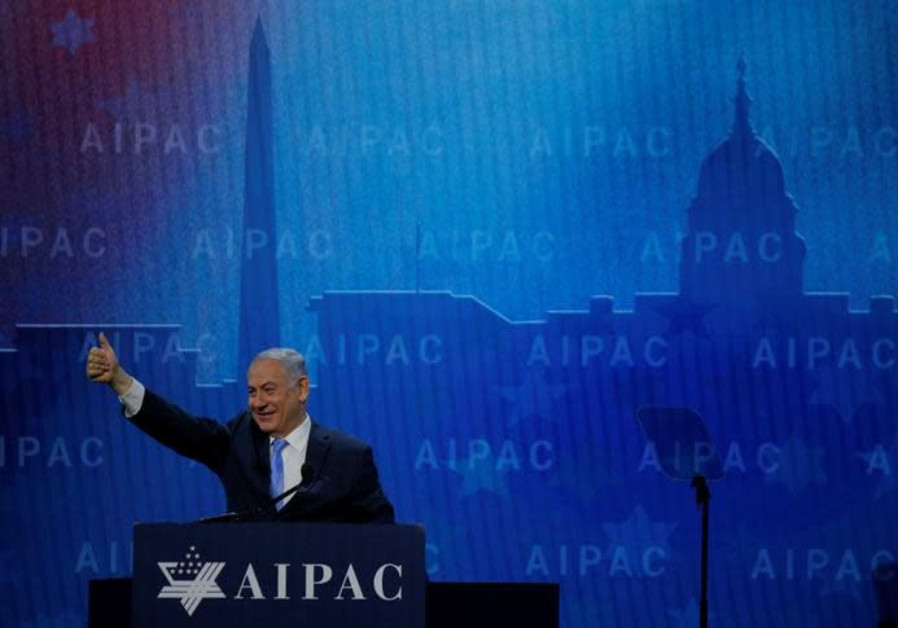March’s AIPAC conference could influence next Israeli election date

Israeli Prime Minister Benjamin Netanyahu takes the stage to speak at the AIPAC policy conference in Washington, DC, US, March 6, 2018. (photo credit: REUTERS/BRIAN SNYDER)
Following Defense Minister Avigdor Lieberman’s bombshell resignation on Wednesday, there will be endless speculation in the coming days about when new elections will be held.
Lieberman, as he said clearly at his press conference, would like to see them as soon as possible. His reasoning is simple. He framed his resignation as a principled one, born of disagreements with Prime Minister Benjamin Netanyahu and the government over what he claimed were its soft policies toward Hamas in Gaza. As such, he wants to go to the polls before the trauma of the last few days, indeed the last few months of terror from Gaza, recedes in people’s minds.
Going to elections sooner rather than later would also catch fledgling parties – such as one that may be put together by former chief of staff Benny Gantz — off guard, and not yet fully prepared to battle a national campaign.
Prime Minister Benjamin Netanyahu, on the other hand, would like to wait a little longer, until the events of the past weekend are forgotten, overtaken by other news that he can help shape.
According to the law, elections need to be held on the Tuesday before the 110th day after the Knesset dissolves itself. That means that were the Knesset to dissolve itself next Monday, the elections would be held on March 5.
In looking at the different math and calculations behind choosing a time for new elections, there is one important date that stands out in Netanyahu’s mind: March 24.
Actually, March 24 – March 26, the date of the American Israel Public Affairs Committee (AIPAC) annual policy conference in Washington DC.
Netanyahu loves that event. He attends and addresses policy conference almost every year, and speaks to it by live hookup on those rare occasions where he is otherwise predisposed. He is always very warmly received at the AIPAC parley, and gives a rousing address covered live in Israel. It is Netanyahu doing what Netanyahu does best: putting forth Israel’s cause forcefully on a big stage.
The AIPAC parley does something else as well, it affords the prime minister a reason to be in Washington. Once in Washington he will, of course, meet the US president. And with US President Donald Trump, unlike Trump’s predecessor, Netanyahu will get a warm embrace.
Both those elements – a rousing reception by 18,000 people to a powerful speech on a big stage and a bear hug from the US president – are things that Netanyahu would love to have his domestic audience witness just prior to elections.
Sound familiar?
The last elections to the Knesset took place on March 17, 2015. On March 2 of that year Netanyahu addressed AIPAC, and on March 3 he gave his controversial speech against the Iranian nuclear deal to a special joint session of the US Congress. Then president Barack Obama, his secretary of state John Kerry, and some Democrats may have resented the prime minister for it, but this played very well among Netanyahu’s base in Israel, and he swept to election victory two weeks later.
Trips abroad play to Netanyahu’s strengths, and trips to Washington these days – in the era of a friendly and supportive president – even more so. These trips frame Netanyahu as the quintessential statesman. The optics of the prime minister addressing AIPAC and then sitting in the Oval Office next to a warm and supportive president can only help him at the polls back home.
So when Netanyahu and his political advisors look at the calendar for that ideal day on which to hold the elections, March 24 is a date that stands out. Ideally, they would like to go to the polls just a week or two after that.
Join Jerusalem Post Premium Plus now for just $5 and upgrade your experience with an ads-free website and exclusive content. Click here>>






Comments are closed.